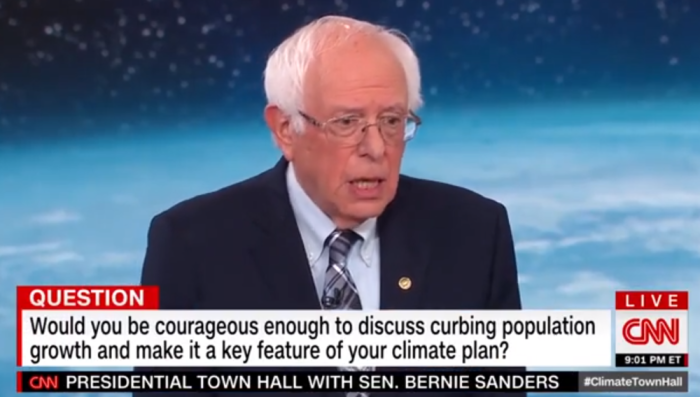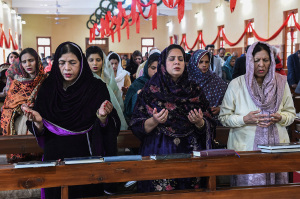Are we saving the earth for children or from them?

People are the problem. Well, prospective people. That was the message from Bernie Sanders and others at CNN’s Climate Town Hall. There are too many people. How to solve the problem? Kill off the children of the poor before they’re even born.
Bernie Sanders presented a climate change plan which, he admitted, would cause “some pain” — especially if you are a woman in the developing world. Those who didn’t tune in because it was going to be seven hours on climate issues missed onstage revelations like this:
“There will be a transition and there will be some pain there,” Sanders continued. “There’s going to be change and we’re going to have to ask people to understand that we’ve got to make those changes now even though they’re going to be a little uncomfortable for the sake of future generations.”
But those future generations, in Bernie’s world, would only be born in certain places to certain kinds of people. Poor people in developing countries would be assisted in not having babies through U.S. taxpayer-funded abortions. Bernie Sanders isn’t going to save the planet for children but from them.
While I support the cooperative work with global partners to make birth control available to women everywhere and de-stigmatize its use around the world, I do not support the use of U.S. taxpayer dollars to weaponize abortion against the poor in the developing world. Is that what’s he’s really proposing, you ask? Yes. When he makes references to the Mexico City agreement and U.S. aid, that’s exactly what he means.
It is actually the Mexico City Policy and it has been instated, revoked, and reinstated every time there’s a change in the U.S. Presidency. On January 23, 2017, the third executive order signed by the newly inaugurated Donald Trump put the Mexico City Policy back into effect. It was originally signed in 1984 by President Ronald Reagan and named after the city where the announcement was made as part of a United Nations population conference.
The policy prevents foreign entities receiving U.S. taxpayer funds from advocating for abortion. The complication comes when funds are also restricted from international family planning services. It is an area where real conversations need to take place as women do need education and access to effective birth control as well as the de-stigmatization of its use. But it must be made clear that abortion is not birth control. As these lines were blurred by international family planning services they were cut off from U.S. taxpayer funds.
Since its signing, this policy has become a political ping-pong. George H.W. Bush continued the policy under his presidency but when Bill Clinton was elected in 1992 and inaugurated in 1993, he reversed the Mexico City Policy. Then in 2001, when George W. Bush was inaugurated, he put the policy back into effect. Eight years later, when Barack Obama took office, he once again rescinded the policy and in 2017 President Trump put it back into effect as the signing of his third executive order. On this one issue, elections matter.
There are really only a few federal provisions protecting the conscience of the American taxpayer against the exportation of abortion through U.S. international aid. They are the Helms Amendment (1973), the Hyde Amendment (1976) and the aforementioned Mexico City Policy (1984).
- The Helms Amendment, following the Supreme Court decision in Roe v. Wade creating the right of abortion nationwide, limited the use of U.S. foreign assistance for abortion.
- In 1976, Congress passed the Hyde Amendment preventing the use of any United States federal funding from the procuring of an abortion here in the United States, particularly through Medicaid.
- Then in 1984 President Reagan signs the Mexico City Policy into effect.
As noted, the Mexico City Policy goes into and out of effect depending on who is president of the United States. But the Hyde Amendment is also under constant threat and Democrats are committed to its repeal. Which leads us to wonder, why are babies such a partisan issue?
To answer that you have to consider the worldview behind the ideas. The morality of human reproduction and the relative value of human life is determined by your worldview. If you view life as precious and children as a sacred trust and the world as the garden we’ve been set over as stewards all under the sovereign authority of a good and gracious God, then there’s no fear of too many people. If, however, you’re operating out of worldview limited to a closed system of finite resources where everything is a competition for survival of the fittest, then children are not only a burden, but a threat.
I first encountered this thinking in the teachings of Peter Singer from Princeton University. He not only argues for abortion, infanticide and the active euthanasia of the old and disabled, he considers forced abortion a legitimate use of government power in order to reduce population growth and save the environment. But those are the ideas of an ivory tower moral philosopher not a practical politician, right? Wrong. Singer’s ideas have become, over time, the ideas of the elite in American politics. That’s how it works.
This is one conversation of the day into which Christians must press. Liberty and the personal pursuit of happiness mean nothing in a generation if there is no next generation. Life is where it literally all begins and Christians have to engage the challenges of poverty without compromising the conviction that every human being has the inherent dignity of an image bearer of the living God.
There are ways to encourage positive development in places where people currently live in poverty. What might happen if we talked about advancing the human flourishing of all people and growing the economies everywhere through responsible stewardship? What if we talked about choosing to live more simply “here” so others could simply live “there?” I, for one, am hopeful about the future – not because I see a future of scarcity but one of abundant life.
Originally posted at The Reconnect.
Carmen LaBerge is host of the "Connecting Faith with Carmen LaBerge" radio program, author of Speak the Truth: How to Bring God Back Into Every Conversation and Executive Director of the Common Ground Christian Network.




























